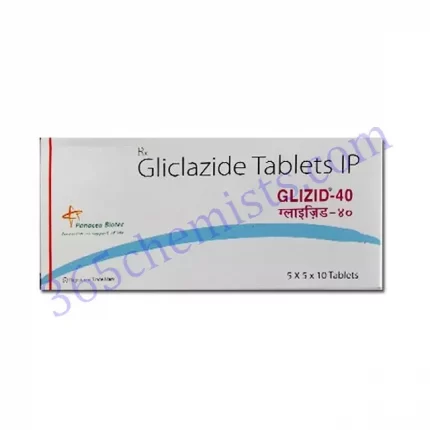GLIMISAVE MAX 3MG TABLET
GLIMISAVE MAX 3MG TABLET is a combination of two anti-diabetic drugs: Glimepiride and Metformin. Glimepiride, which is a ‘sulfonylurea’, acts by increasing the amount of insulin released by the pancreas. Metformin, which is a ‘biguanide’, acts by lowering the glucose production in the liver, delaying glucose absorption from the intestines and increasing the body’s response to insulin. In a nutshell, the two medicines together prevent the blood glucose levels from rising to very high levels thus keeping your Diabetes under control.
Type 2 diabetes is a chronic or lifelong condition that affects the way your body processes glucose. People with type 2 diabetes either do not produce enough insulin or if at all the insulin is produced, it is unable to perform its function in the body (insulin resistance). Due to this, the blood glucose level increases and symptoms such as frequent urination, increased thirst and increased hunger start. It can lead to serious complications like skin infection, eye problems (retinopathy), nerve damage (neuropathy), diabetic foot (foot ulcer), kidney disease (nephropathy), high blood pressure, and even stroke.
By the above-mentioned mechanisms, the two medicines in GLIMISAVE MAX 3MG TABLET act together to keep your blood sugar levels under check. The strict control of blood sugars is especially important to mention the many disabling side effects of Diabetes. GLIMISAVE MAX 3MG TABLET shows optimum effects when taken along with healthy lifestyle changes like weight loss, regular exercise, healthy diet etc.
GLIMISAVE MAX 3MG TABLET should be taken with food to avoid an upset stomach. GLIMISAVE MAX 3MG TABLET should be taken at the same time of the day each time for the best results. For better advise, your doctor will decide what dose should be taken and it can change timely depending upon your condition. A common side effect of GLIMISAVE MAX 3MG TABLET is hypoglycaemia (low blood glucose levels) characterized by dizziness, sweating, palpitations, hunger pangs, dry mouth and skin etc. So, to avoid hypoglycaemia, you should not miss meals and also should carry some form of sugar along with you. Other side effects include taste change, nausea, diarrhoea, stomach pain, headache, upper respiratory symptoms.
GLIMISAVE MAX 3MG TABLET should not be stopped even if you feel better, without consulting your doctor as sugar level keeps changing. If you stop taking GLIMISAVE MAX 3MG TABLET abruptly, it may increase your sugar levels which could further increase the risk of eyesight loss (retinopathy), kidney (nephropathy) and nerve damage (neuropathy). GLIMISAVE MAX 3MG TABLET should not be taken if you have type 1 diabetes mellitus, severe kidney or liver disease. Please inform your doctor if you have any type of heart disease, is or are planning to get pregnant or are breastfeeding.
Uses of GLIMISAVE MAX 3MG TABLET
Diabetes Mellitus Type 2
Medicinal Benefits
GLIMISAVE MAX 3MG TABLET helps in controlling blood sugar level without any weight gain. Besides this, it is also cardio-protective preventing the heart from further complications. GLIMISAVE MAX 3MG TABLET also helps to prevent serious complications of diabetes such as kidney damage (Diabetic Nephropathy), blindness (Diabetic Retinopathy), loss of sensation in your hands and feet (Diabetic Neuropathy) or even loss of foot! GLIMISAVE MAX 3MG TABLET also helps to reduce your chance of having a heart attack or stroke. Being a combination of two drugs, it reduces the need to take multiple pills and hence makes it easier to remember to take the drugs.
Related Product
Glimisave 1mg Tablet
Glimisave 2 mg Tablet
Glimisave 4mg Tablet
Glimisave M1 Tablet
Glimisave M2 Tablet
Glimisave M3 Tablet
Glimisave M1 750mg Tablet
Glimisave M1 850mg Tablet
Glimisave M1 Forte Tablet
Glimisave M2 750mg Tablet
Glimisave M2 850mg Tablet
Glimisave M2 Forte Tablet
Glimisave M3 Forte Tablet
Glimisave M4 Forte Tablet
Glimisave Max 2 Tablet
Glimisave Max 3 Tablet
Glimisave Max Forte 1 Tablet
Glimisave Max Forte 2mg Tablet
GlimiSave Max Forte 3mg Tablet
Glimisave MV 1 Tablet
Glimisave MV 2 Tablet
Glimisave MV 2.2F Tablet
Glimisave MV 2.3 Tablet
Glimisave MV 3.3 Tablet
Glimisave MV2 Forte Tablet
Directions for Use
Storage
Side Effects of GLIMISAVE MAX 3MG TABLET
Most of the side effects of GLIMISAVE MAX 3MG TABLET do not require medical attention and gradually resolve over time. However, if the side effects are persistent, reach out to your doctor. A common side effect of GLIMISAVE MAX 3MG TABLET is hypoglycaemia (low blood glucose level) characterized by dizziness, sweating, palpitations, hunger pangs, dry mouth and skin etc. Some people may also experience taste change, nausea, diarrhoea, stomach pain, flatulence, headache, upper respiratory symptoms, skin rash etc. It is not necessary for everyone to experience the above side effects. In case of any discomfort, speak with your doctor.
In-Depth Precautions and Warning
Drug Warnings
Some diabetic patient taking GLIMISAVE MAX 3MG TABLET may develop a serious condition called lactic acidosis. In lactic acidosis, there is too much of lactic acid accumulated in the blood. So, your liver and kidney proper functioning is required for the elimination of excess lactic acid from the blood. You should not take metformin if you have kidney disease, as measured by a blood test. GLIMISAVE MAX 3MG TABLET may lower vitamin B12 levels, so try to have blood test annual blood and vitamin. Metformin when used with insulin may extremely lower the blood sugar level. So, the doctor may lower the dose of insulin.
Drug Interactions
Drug-Drug Interaction: GLIMISAVE MAX 3MG TABLET may interact with insulin, high blood pressure lowering pills (hydrochlorothiazide, amlodipine), water pills/diuretics (furosemide), heart failure-related medicines (digoxin), anti-hypertensive (metoprolol), steroids (prednisolone), thyroid hormones etc. So, tell your doctor if you are using these drugs before taking GLIMISAVE MAX 3MG TABLET.
Drug-Food Interaction: Taking GLIMISAVE MAX 3MG TABLET with alcoholic beverages may increase the risk of a rare but serious and potentially life-threatening condition known as lactic acidosis (build-up of lactic acid in the blood) and hypoglycaemia.
Drug-Disease Interaction: GLIMISAVE MAX 3MG TABLET should be avoided in patients with vitamin B12 deficiency, kidney problems, liver problem, cardiovascular disease (heart related issues), and low blood sugar level (hypoglycaemia) as it may worsen the condition.












